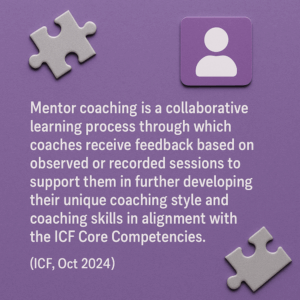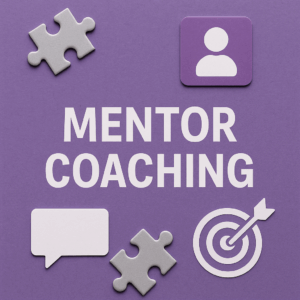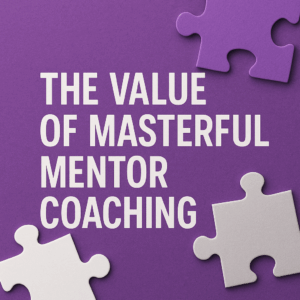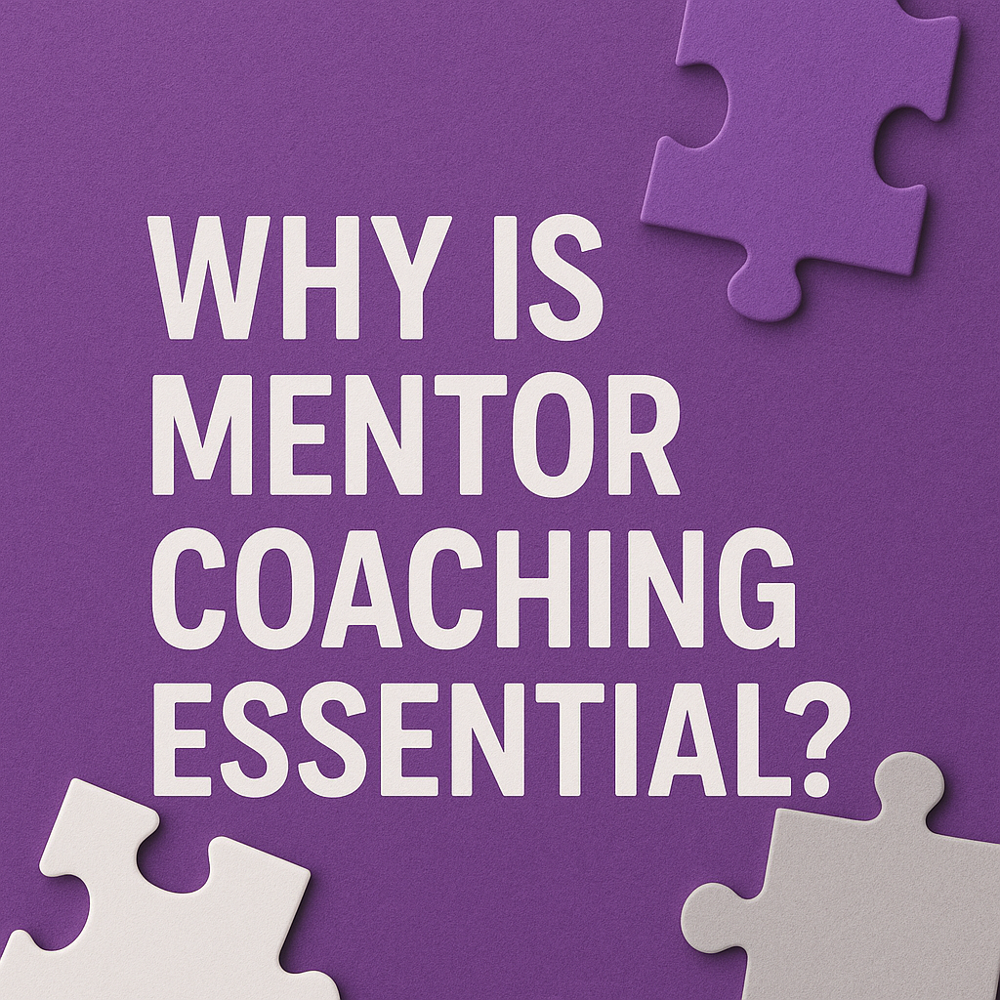Why is mentor coaching essential for ICF credentialing and continuing professional growth?
By Caroline Beckett MCC EIA/SP ESIA MA
Founder, MCC and EIA/SP Coach, Critical Friend, Certified ESIA Supervisor and Mentor Coach, Instructional Designer and Trainer at JIGSAW.COACH LTD

Mentor Coaching is not just a step in the credentialing journey – it’s an essential practice that sustains, deepens, and refines coaching excellence. Whether you’re preparing for your ICF credential, renewing it, or simply dedicated to developing your craft, Mentor Coaching offers a powerful, reflective space to grow your confidence, capability, and presence as a coach.
Let’s keep in mind that mentor coaching is not coaching and it’s not supervision.
Why does mentor coaching matter for ICF credentialing?
For many coaches, the initial encounter with Mentor Coaching arises from the ICF credentialing process. To apply for a credential, or to renew an ACC credential, coaches must complete at least ten hours of Mentor Coaching focused specifically on the ICF Core Competencies.
However, the purpose of these sessions extends far beyond meeting an administrative requirement. The process is designed to help you elevate your practice – to fine-tune your listening, sharpen your questioning, and strengthen your overall coaching presence. Through targeted feedback and developmental dialogue, Mentor Coaching helps coaches move from competence toward mastery.
A qualified mentor coach provides structured, competency-based feedback that helps coaches to recognise strengths and identify areas for growth. It is very much a collaborative, generative and supportive dialogue that fosters greater self-awareness and clarity about what great coaching looks and feels like in practice.
ICF requires 10 hours of mentor coaching (at least three of which must be 1:1) for a credential application or an ACC renewal.
Please also remember that you can use up to 10 hours of mentor coaching (group or 1:1) for a PCC or an MCC renewal.
A hybrid approach
The term Mentor Coaching is defined by the unique blend of high-quality coaching skills and best mentoring practice. It combines the art of generative conversation – where insight and awareness naturally emerge – with the structure of developmental feedback grounded in the ICF frameworks (Core Competencies, BARS, Markers).
A skilled mentor coach creates a supportive, collaborative space where reflective dialogue, specific guidance, and clear, evidence-based feedback enable growth and confidence. Through this balanced approach of challenge and support, coaches are encouraged to refine their skills, strengthen their professional presence, and continue evolving toward greater mastery in their practice.
Beyond credentialing: Sustaining and enhancing good practice
Once the credential is achieved and the celebrations have quieted, many coaches ask themselves: What’s next?
The simple answer is to continue reflecting, learning and evolving; Mentor Coaching is an effective way to do this as it focuses on your skills, your practice and your performance.
By engaging in ongoing Mentor Coaching beyond the ICF requirements, you’re committing to the continuous refinement of your skills and mindset as a practitioner. This dedicated time for reflective practice allows you to pause, review your coaching patterns, and challenge assumptions. It creates a safe and supportive space to explore your edge – those areas where deeper awareness can lead to transformational improvement. Plus, an effecive mentor coach will also be able to support you in benchmarking your skills to ICF frameworks.
When coaches invest in regular Mentor Coaching, they are investing in sustained professional excellence. It becomes a practice of maintenance and momentum – keeping your coaching fresh, authentic and aligned with best practice.
The value of a masterful mentor coach
An effective mentor coach offers much more than a checklist, a scorecard and an analysis of your performance. They act as a trusted partner – a critical friend – who understands your context and supports you to shape your unique coaching style.
Mentor Coaching, at its best, is a partnership and conversation that honours what is already working and invites exploration of what could be even better.
A masterful mentor coach will:
-
Strive to understand your unique coaching style and context, as well as how it influences your approach.
-
Encourage the development of your own authentic coaching style.
-
Identify goals and areas for development and stretch.
-
Provide constructive, evidence-based feedback mapped to ICF frameworks.
-
Support you in building both confidence and competence.
-
Highlight recurring patterns and offer insights and observations.
Creating space for growth
As coaches, we hold reflective space for others every day. Mentor Coaching invites us to step into that same space ourselves – to pause, reflect, and engage in our own professional evolution. It’s where awareness deepens, confidence grows, and capability expands.
As Steven Spielberg once said, “The delicate balance of mentoring someone is not creating them in your own image, but giving them the opportunity to create themselves.” This sentiment captures the essence of Mentor Coaching: a supportive, developmental relationship that empowers coaches to grow in their own unique way.
As an experienced mentor coach, with a proven track-record of success, I am proud to support coaches on every step of their professional journey – from credentialing through to mastery. Mentor Coaching is not just a requirement; it’s a commitment to excellence and to the lifelong learning that defines our profession.

Interested in deepening your coaching practice?
Find out more about Mentor Coaching options and how Caroline can support your ICF credential journey at www.jigsaw.coach/mentor-coaching. Dates for group mentor coaching with Caroline can be found here.
You can also visit the ICF website for further information about ICF requirements related to Mentor Coaching.


